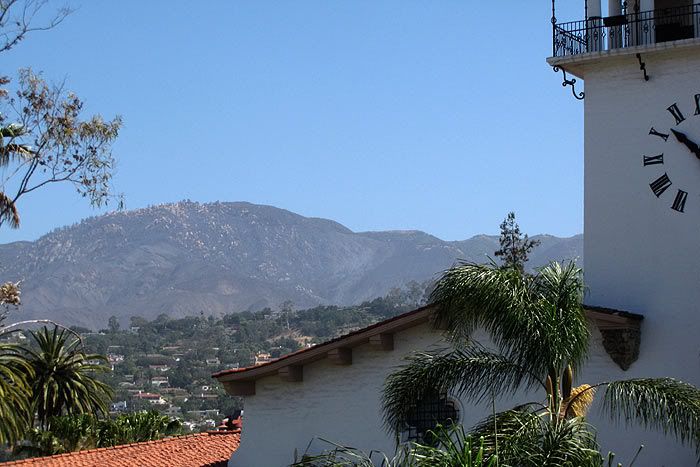 Santa Barbara is a little paradise on earth, nestled between the ocean and the mountains and looking south into the sun. Until the hillsides start to burn, and then everything changes. Living beneath a fire is like driving beside a train wreck -- except that it's a wreck that never ends. You can't stop looking at it. Out and about during the day you keep your radio tuned to the stations with the fire news. In the evening you watch the local TV with its endless photos of burning fire, smoldering fire, firefighters and aerial tankers. You become an expert on wind direction, and relative humidity. You can tell the wind direction and strength by the sound of it -- you don't even have to look at the tree across the street to know that the wind has picked up.
Santa Barbara is a little paradise on earth, nestled between the ocean and the mountains and looking south into the sun. Until the hillsides start to burn, and then everything changes. Living beneath a fire is like driving beside a train wreck -- except that it's a wreck that never ends. You can't stop looking at it. Out and about during the day you keep your radio tuned to the stations with the fire news. In the evening you watch the local TV with its endless photos of burning fire, smoldering fire, firefighters and aerial tankers. You become an expert on wind direction, and relative humidity. You can tell the wind direction and strength by the sound of it -- you don't even have to look at the tree across the street to know that the wind has picked up.You go to sleep wondering if the fire will move into the city; you wake up and check the internet right away to see where the fire is burning this morning.
And everywhere all day long it's ash and smoke. Many folks are wearing facemasks. The ash accumulates everywhere -- on cars, on the ground, blown into corners by eddies of the wind. Sometimes the ash is white. That's from the brush on the hillside. Sometimes the ash is black. They say that's when houses are burning. A debate rages: can I use a little water to wash the ash away, or will that take away from the pressure the firefighters so desperately need?
You want to help, but other than waving and cheering when fire engines pass by, there's not a lot you can do. When the wind comes up there's not a lot the firefighters can do, either, other than take cover and pray. Mostly you wait for a change in the weather, because the only way the fire will be brought under control is with the help of the weather.
It's a lot like today's economy. The same sense of helplessness and waiting pervades. You have to watch, but you can't find much to do. Even the officials whose job it is to mitigate disaster have little they can do until the weather changes. Half the economy has evacuated, it seems, while the other half is waiting to see how it will affect them. The outcome is very much in doubt, yet somehow we feel we will survive.

No comments:
Post a Comment